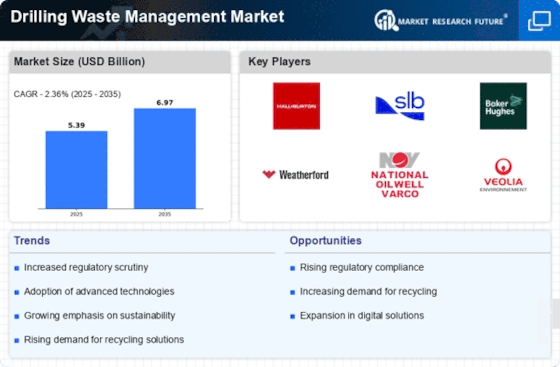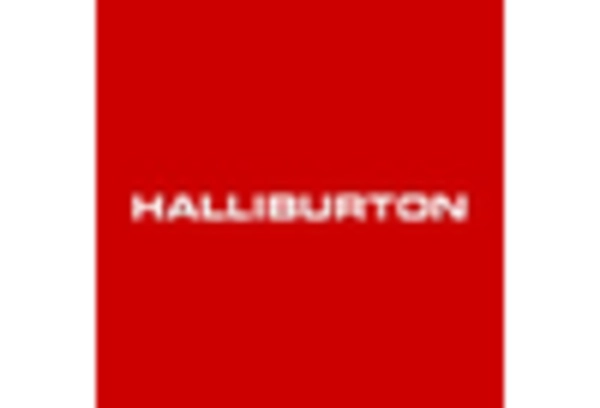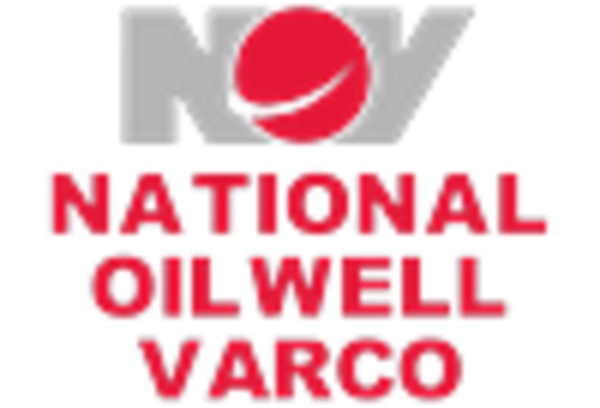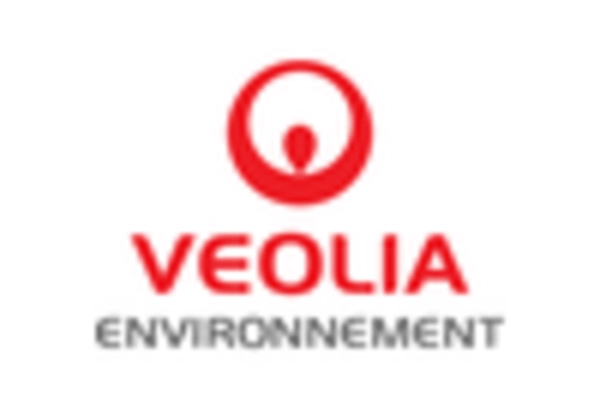Waste Treatment
Waste Disposal
Waste Recycling
Consulting
Drilling Operations
Reservoir Fluids
Completion and Workover Waste
Production Waste
Solids Control
Cuttings Treatment
Thermal Desorption
Bioremediation
Onshore
Offshore
Geothermal
Mining
North America
Europe
South America
Asia Pacific
Middle East and Africa
North America Outlook (USD Billion, 2019-2032)
North America Drilling Waste Management Market by Service Type
Waste Treatment
Waste Disposal
Waste Recycling
Consulting
North America Drilling Waste Management Market by Source of Waste Type
Drilling Operations
Reservoir Fluids
Completion and Workover Waste
Production Waste
North America Drilling Waste Management Market by Technology Type
Solids Control
Cuttings Treatment
Thermal Desorption
Bioremediation
North America Drilling Waste Management Market by End User Type
Onshore
Offshore
Geothermal
Mining
North America Drilling Waste Management Market by Regional Type
US
Canada
US Outlook (USD Billion, 2019-2032)
US Drilling Waste Management Market by Service Type
Waste Treatment
Waste Disposal
Waste Recycling
Consulting
US Drilling Waste Management Market by Source of Waste Type
Drilling Operations
Reservoir Fluids
Completion and Workover Waste
Production Waste
US Drilling Waste Management Market by Technology Type
Solids Control
Cuttings Treatment
Thermal Desorption
Bioremediation
US Drilling Waste Management Market by End User Type
Onshore
Offshore
Geothermal
Mining
CANADA Outlook (USD Billion, 2019-2032)
CANADA Drilling Waste Management Market by Service Type
Waste Treatment
Waste Disposal
Waste Recycling
Consulting
CANADA Drilling Waste Management Market by Source of Waste Type
Drilling Operations
Reservoir Fluids
Completion and Workover Waste
Production Waste
CANADA Drilling Waste Management Market by Technology Type
Solids Control
Cuttings Treatment
Thermal Desorption
Bioremediation
CANADA Drilling Waste Management Market by End User Type
Onshore
Offshore
Geothermal
Mining
Europe Outlook (USD Billion, 2019-2032)
Europe Drilling Waste Management Market by Service Type
Waste Treatment
Waste Disposal
Waste Recycling
Consulting
Europe Drilling Waste Management Market by Source of Waste Type
Drilling Operations
Reservoir Fluids
Completion and Workover Waste
Production Waste
Europe Drilling Waste Management Market by Technology Type
Solids Control
Cuttings Treatment
Thermal Desorption
Bioremediation
Europe Drilling Waste Management Market by End User Type
Onshore
Offshore
Geothermal
Mining
Europe Drilling Waste Management Market by Regional Type
Germany
UK
France
Russia
Italy
Spain
Rest of Europe
GERMANY Outlook (USD Billion, 2019-2032)
GERMANY Drilling Waste Management Market by Service Type
Waste Treatment
Waste Disposal
Waste Recycling
Consulting
GERMANY Drilling Waste Management Market by Source of Waste Type
Drilling Operations
Reservoir Fluids
Completion and Workover Waste
Production Waste
GERMANY Drilling Waste Management Market by Technology Type
Solids Control
Cuttings Treatment
Thermal Desorption
Bioremediation
GERMANY Drilling Waste Management Market by End User Type
Onshore
Offshore
Geothermal
Mining
UK Outlook (USD Billion, 2019-2032)
UK Drilling Waste Management Market by Service Type
Waste Treatment
Waste Disposal
Waste Recycling
Consulting
UK Drilling Waste Management Market by Source of Waste Type
Drilling Operations
Reservoir Fluids
Completion and Workover Waste
Production Waste
UK Drilling Waste Management Market by Technology Type
Solids Control
Cuttings Treatment
Thermal Desorption
Bioremediation
UK Drilling Waste Management Market by End User Type
Onshore
Offshore
Geothermal
Mining
FRANCE Outlook (USD Billion, 2019-2032)
FRANCE Drilling Waste Management Market by Service Type
Waste Treatment
Waste Disposal
Waste Recycling
Consulting
FRANCE Drilling Waste Management Market by Source of Waste Type
Drilling Operations
Reservoir Fluids
Completion and Workover Waste
Production Waste
FRANCE Drilling Waste Management Market by Technology Type
Solids Control
Cuttings Treatment
Thermal Desorption
Bioremediation
FRANCE Drilling Waste Management Market by End User Type
Onshore
Offshore
Geothermal
Mining
RUSSIA Outlook (USD Billion, 2019-2032)
RUSSIA Drilling Waste Management Market by Service Type
Waste Treatment
Waste Disposal
Waste Recycling
Consulting
RUSSIA Drilling Waste Management Market by Source of Waste Type
Drilling Operations
Reservoir Fluids
Completion and Workover Waste
Production Waste
RUSSIA Drilling Waste Management Market by Technology Type
Solids Control
Cuttings Treatment
Thermal Desorption
Bioremediation
RUSSIA Drilling Waste Management Market by End User Type
Onshore
Offshore
Geothermal
Mining
ITALY Outlook (USD Billion, 2019-2032)
ITALY Drilling Waste Management Market by Service Type
Waste Treatment
Waste Disposal
Waste Recycling
Consulting
ITALY Drilling Waste Management Market by Source of Waste Type
Drilling Operations
Reservoir Fluids
Completion and Workover Waste
Production Waste
ITALY Drilling Waste Management Market by Technology Type
Solids Control
Cuttings Treatment
Thermal Desorption
Bioremediation
ITALY Drilling Waste Management Market by End User Type
Onshore
Offshore
Geothermal
Mining
SPAIN Outlook (USD Billion, 2019-2032)
SPAIN Drilling Waste Management Market by Service Type
Waste Treatment
Waste Disposal
Waste Recycling
Consulting
SPAIN Drilling Waste Management Market by Source of Waste Type
Drilling Operations
Reservoir Fluids
Completion and Workover Waste
Production Waste
SPAIN Drilling Waste Management Market by Technology Type
Solids Control
Cuttings Treatment
Thermal Desorption
Bioremediation
SPAIN Drilling Waste Management Market by End User Type
Onshore
Offshore
Geothermal
Mining
REST OF EUROPE Outlook (USD Billion, 2019-2032)
REST OF EUROPE Drilling Waste Management Market by Service Type
Waste Treatment
Waste Disposal
Waste Recycling
Consulting
REST OF EUROPE Drilling Waste Management Market by Source of Waste Type
Drilling Operations
Reservoir Fluids
Completion and Workover Waste
Production Waste
REST OF EUROPE Drilling Waste Management Market by Technology Type
Solids Control
Cuttings Treatment
Thermal Desorption
Bioremediation
REST OF EUROPE Drilling Waste Management Market by End User Type
Onshore
Offshore
Geothermal
Mining
APAC Outlook (USD Billion, 2019-2032)
APAC Drilling Waste Management Market by Service Type
Waste Treatment
Waste Disposal
Waste Recycling
Consulting
APAC Drilling Waste Management Market by Source of Waste Type
Drilling Operations
Reservoir Fluids
Completion and Workover Waste
Production Waste
APAC Drilling Waste Management Market by Technology Type
Solids Control
Cuttings Treatment
Thermal Desorption
Bioremediation
APAC Drilling Waste Management Market by End User Type
Onshore
Offshore
Geothermal
Mining
APAC Drilling Waste Management Market by Regional Type
China
India
Japan
South Korea
Malaysia
Thailand
Indonesia
Rest of APAC
CHINA Outlook (USD Billion, 2019-2032)
CHINA Drilling Waste Management Market by Service Type
Waste Treatment
Waste Disposal
Waste Recycling
Consulting
CHINA Drilling Waste Management Market by Source of Waste Type
Drilling Operations
Reservoir Fluids
Completion and Workover Waste
Production Waste
CHINA Drilling Waste Management Market by Technology Type
Solids Control
Cuttings Treatment
Thermal Desorption
Bioremediation
CHINA Drilling Waste Management Market by End User Type
Onshore
Offshore
Geothermal
Mining
INDIA Outlook (USD Billion, 2019-2032)
INDIA Drilling Waste Management Market by Service Type
Waste Treatment
Waste Disposal
Waste Recycling
Consulting
INDIA Drilling Waste Management Market by Source of Waste Type
Drilling Operations
Reservoir Fluids
Completion and Workover Waste
Production Waste
INDIA Drilling Waste Management Market by Technology Type
Solids Control
Cuttings Treatment
Thermal Desorption
Bioremediation
INDIA Drilling Waste Management Market by End User Type
Onshore
Offshore
Geothermal
Mining
JAPAN Outlook (USD Billion, 2019-2032)
JAPAN Drilling Waste Management Market by Service Type
Waste Treatment
Waste Disposal
Waste Recycling
Consulting
JAPAN Drilling Waste Management Market by Source of Waste Type
Drilling Operations
Reservoir Fluids
Completion and Workover Waste
Production Waste
JAPAN Drilling Waste Management Market by Technology Type
Solids Control
Cuttings Treatment
Thermal Desorption
Bioremediation
JAPAN Drilling Waste Management Market by End User Type
Onshore
Offshore
Geothermal
Mining
SOUTH KOREA Outlook (USD Billion, 2019-2032)
SOUTH KOREA Drilling Waste Management Market by Service Type
Waste Treatment
Waste Disposal
Waste Recycling
Consulting
SOUTH KOREA Drilling Waste Management Market by Source of Waste Type
Drilling Operations
Reservoir Fluids
Completion and Workover Waste
Production Waste
SOUTH KOREA Drilling Waste Management Market by Technology Type
Solids Control
Cuttings Treatment
Thermal Desorption
Bioremediation
SOUTH KOREA Drilling Waste Management Market by End User Type
Onshore
Offshore
Geothermal
Mining
MALAYSIA Outlook (USD Billion, 2019-2032)
MALAYSIA Drilling Waste Management Market by Service Type
Waste Treatment
Waste Disposal
Waste Recycling
Consulting
MALAYSIA Drilling Waste Management Market by Source of Waste Type
Drilling Operations
Reservoir Fluids
Completion and Workover Waste
Production Waste
MALAYSIA Drilling Waste Management Market by Technology Type
Solids Control
Cuttings Treatment
Thermal Desorption
Bioremediation
MALAYSIA Drilling Waste Management Market by End User Type
Onshore
Offshore
Geothermal
Mining
THAILAND Outlook (USD Billion, 2019-2032)
THAILAND Drilling Waste Management Market by Service Type
Waste Treatment
Waste Disposal
Waste Recycling
Consulting
THAILAND Drilling Waste Management Market by Source of Waste Type
Drilling Operations
Reservoir Fluids
Completion and Workover Waste
Production Waste
THAILAND Drilling Waste Management Market by Technology Type
Solids Control
Cuttings Treatment
Thermal Desorption
Bioremediation
THAILAND Drilling Waste Management Market by End User Type
Onshore
Offshore
Geothermal
Mining
INDONESIA Outlook (USD Billion, 2019-2032)
INDONESIA Drilling Waste Management Market by Service Type
Waste Treatment
Waste Disposal
Waste Recycling
Consulting
INDONESIA Drilling Waste Management Market by Source of Waste Type
Drilling Operations
Reservoir Fluids
Completion and Workover Waste
Production Waste
INDONESIA Drilling Waste Management Market by Technology Type
Solids Control
Cuttings Treatment
Thermal Desorption
Bioremediation
INDONESIA Drilling Waste Management Market by End User Type
Onshore
Offshore
Geothermal
Mining
REST OF APAC Outlook (USD Billion, 2019-2032)
REST OF APAC Drilling Waste Management Market by Service Type
Waste Treatment
Waste Disposal
Waste Recycling
Consulting
REST OF APAC Drilling Waste Management Market by Source of Waste Type
Drilling Operations
Reservoir Fluids
Completion and Workover Waste
Production Waste
REST OF APAC Drilling Waste Management Market by Technology Type
Solids Control
Cuttings Treatment
Thermal Desorption
Bioremediation
REST OF APAC Drilling Waste Management Market by End User Type
Onshore
Offshore
Geothermal
Mining
South America Outlook (USD Billion, 2019-2032)
South America Drilling Waste Management Market by Service Type
Waste Treatment
Waste Disposal
Waste Recycling
Consulting
South America Drilling Waste Management Market by Source of Waste Type
Drilling Operations
Reservoir Fluids
Completion and Workover Waste
Production Waste
South America Drilling Waste Management Market by Technology Type
Solids Control
Cuttings Treatment
Thermal Desorption
Bioremediation
South America Drilling Waste Management Market by End User Type
Onshore
Offshore
Geothermal
Mining
South America Drilling Waste Management Market by Regional Type
Brazil
Mexico
Argentina
Rest of South America
BRAZIL Outlook (USD Billion, 2019-2032)
BRAZIL Drilling Waste Management Market by Service Type
Waste Treatment
Waste Disposal
Waste Recycling
Consulting
BRAZIL Drilling Waste Management Market by Source of Waste Type
Drilling Operations
Reservoir Fluids
Completion and Workover Waste
Production Waste
BRAZIL Drilling Waste Management Market by Technology Type
Solids Control
Cuttings Treatment
Thermal Desorption
Bioremediation
BRAZIL Drilling Waste Management Market by End User Type
Onshore
Offshore
Geothermal
Mining
MEXICO Outlook (USD Billion, 2019-2032)
MEXICO Drilling Waste Management Market by Service Type
Waste Treatment
Waste Disposal
Waste Recycling
Consulting
MEXICO Drilling Waste Management Market by Source of Waste Type
Drilling Operations
Reservoir Fluids
Completion and Workover Waste
Production Waste
MEXICO Drilling Waste Management Market by Technology Type
Solids Control
Cuttings Treatment
Thermal Desorption
Bioremediation
MEXICO Drilling Waste Management Market by End User Type
Onshore
Offshore
Geothermal
Mining
ARGENTINA Outlook (USD Billion, 2019-2032)
ARGENTINA Drilling Waste Management Market by Service Type
Waste Treatment
Waste Disposal
Waste Recycling
Consulting
ARGENTINA Drilling Waste Management Market by Source of Waste Type
Drilling Operations
Reservoir Fluids
Completion and Workover Waste
Production Waste
ARGENTINA Drilling Waste Management Market by Technology Type
Solids Control
Cuttings Treatment
Thermal Desorption
Bioremediation
ARGENTINA Drilling Waste Management Market by End User Type
Onshore
Offshore
Geothermal
Mining
REST OF SOUTH AMERICA Outlook (USD Billion, 2019-2032)
REST OF SOUTH AMERICA Drilling Waste Management Market by Service Type
Waste Treatment
Waste Disposal
Waste Recycling
Consulting
REST OF SOUTH AMERICA Drilling Waste Management Market by Source of Waste Type
Drilling Operations
Reservoir Fluids
Completion and Workover Waste
Production Waste
REST OF SOUTH AMERICA Drilling Waste Management Market by Technology Type
Solids Control
Cuttings Treatment
Thermal Desorption
Bioremediation
REST OF SOUTH AMERICA Drilling Waste Management Market by End User Type
Onshore
Offshore
Geothermal
Mining
MEA Outlook (USD Billion, 2019-2032)
MEA Drilling Waste Management Market by Service Type
Waste Treatment
Waste Disposal
Waste Recycling
Consulting
MEA Drilling Waste Management Market by Source of Waste Type
Drilling Operations
Reservoir Fluids
Completion and Workover Waste
Production Waste
MEA Drilling Waste Management Market by Technology Type
Solids Control
Cuttings Treatment
Thermal Desorption
Bioremediation
MEA Drilling Waste Management Market by End User Type
Onshore
Offshore
Geothermal
Mining
MEA Drilling Waste Management Market by Regional Type
GCC Countries
South Africa
Rest of MEA
GCC COUNTRIES Outlook (USD Billion, 2019-2032)
GCC COUNTRIES Drilling Waste Management Market by Service Type
Waste Treatment
Waste Disposal
Waste Recycling
Consulting
GCC COUNTRIES Drilling Waste Management Market by Source of Waste Type
Drilling Operations
Reservoir Fluids
Completion and Workover Waste
Production Waste
GCC COUNTRIES Drilling Waste Management Market by Technology Type
Solids Control
Cuttings Treatment
Thermal Desorption
Bioremediation
GCC COUNTRIES Drilling Waste Management Market by End User Type
Onshore
Offshore
Geothermal
Mining
SOUTH AFRICA Outlook (USD Billion, 2019-2032)
SOUTH AFRICA Drilling Waste Management Market by Service Type
Waste Treatment
Waste Disposal
Waste Recycling
Consulting
SOUTH AFRICA Drilling Waste Management Market by Source of Waste Type
Drilling Operations
Reservoir Fluids
Completion and Workover Waste
Production Waste
SOUTH AFRICA Drilling Waste Management Market by Technology Type
Solids Control
Cuttings Treatment
Thermal Desorption
Bioremediation
SOUTH AFRICA Drilling Waste Management Market by End User Type
Onshore
Offshore
Geothermal
Mining
REST OF MEA Outlook (USD Billion, 2019-2032)
REST OF MEA Drilling Waste Management Market by Service Type
Waste Treatment
Waste Disposal
Waste Recycling
Consulting
REST OF MEA Drilling Waste Management Market by Source of Waste Type
Drilling Operations
Reservoir Fluids
Completion and Workover Waste
Production Waste
REST OF MEA Drilling Waste Management Market by Technology Type
Solids Control
Cuttings Treatment
Thermal Desorption
Bioremediation
REST OF MEA Drilling Waste Management Market by End User Type
Onshore
Offshore
Geothermal
Mining


















Leave a Comment